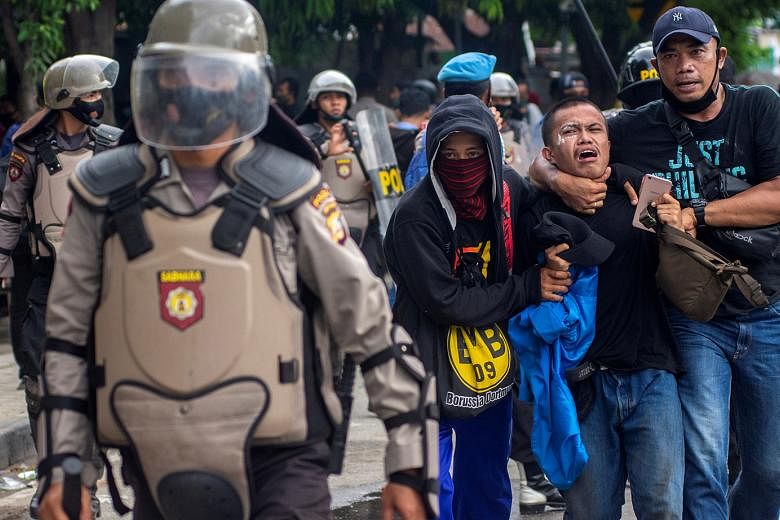President Joko Widodo yesterday defended the passage of a controversial job creation law which has led to protests in a number of cities across Indonesia for three days.
In his first public comments since the law was passed on Monday, Mr Joko, popularly known as Jokowi, said that it could help secure employment for the 2.9 million young people entering the job market each year.
He added that the law is also necessary as the Covid-19 pandemic has affected 3.5 million workers and 6.9 million people are unemployed.
"The job creation law aims to provide as many jobs as possible to job seekers and the unemployed," Mr Joko said in an address from the presidential palace in Bogor, West Java. The speech was live-streamed on YouTube and broadcast by some television stations.
More than 3,800 people - including students, workers and the unemployed - were detained nationwide during rallies this week that at times turned violent, said national police spokesman Argo Yuwono.
The local media reported that smaller protests took place yesterday in several cities on Java and Sumatra islands.
Indonesia's economy, South-east Asia's largest, shrank by 5.32 per cent in the second quarter compared with the same period last year, and the country is expected to fall into recession for the first time in more than two decades.
The "omnibus" job creation Bill revises 79 laws covering a wide range of issues. One big contentious point for unions is that it reduces mandatory severance pay from a maximum of 32 times of a laid-off worker's monthly salary to 19 times, with the government paying an additional six months.
Although a lot of the anger against the legislation has been directed at parts of the Bill affecting workers, the President yesterday noted that it would facilitate the setting up of micro and small-scale enterprises by Indonesians.
"Overlapping regulations and complicated procedures are cut. Micro, small and medium-sized enterprises no longer need business permits. They only need to register. It's very simple," he said.
The law also scraps the minimum amount of capital needed to establish a company, and eases requirements to set up a cooperative as well.
Mr Joko also underlined that the law would support efforts to prevent and eradicate corruption because it would cut red tape and promote an online licensing system.
But the President is facing mounting pressure to repeal the law as unions and Muslim groups prepare to challenge it in court.
Mr Said Iqbal, chairman of the Indonesian Worker Union Confederation, which was among the organisers of the three-day nationwide strike that ended on Thursday, has said it was considering whether to lodge a case in the Constitutional Court.
"We have rejected the law, and therefore we also reject its derivative regulations," he told The Straits Times on Thursday in response to a question about the possibility of negotiations with the government.
Indonesia's largest Muslim organisation, Nahdlatul Ulama, has also publicly stated that it would challenge the law in court.
Meanwhile, some regional leaders, including Jakarta Governor Anies Baswedan, have said that they will pass on the views of those opposed to the legislation to the President.
Dr Anies said he had met protesters, discussed the matter with them and promised to convey their message to the central government, Reuters reported.
The news agency also quoted West Kalimantan Governor Sutarmidji, who goes by one name, as saying in a statement that repealing the law would prevent further clashes "that could create prolonged instability amid a pandemic and an economic recession".

